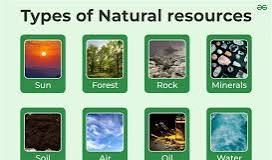“`html
Natural Resources: Examples and Importance
Natural resources are materials or substances that occur in nature and can be used for economic gain. These resources play a crucial role in sustaining life on Earth and supporting various industries. Here are some examples of natural resources:
Water
Water is essential for all living organisms. It is used for drinking, agriculture, industrial processes, and generating electricity through hydropower. Access to clean water is a fundamental human right.
Air
Air is a mixture of gases that we breathe to sustain life. It also plays a vital role in climate regulation and the dispersal of seeds and pollen for plant reproduction.
Soil
Soil is the foundation for agriculture and provides nutrients for plants to grow. It supports biodiversity by hosting microorganisms, insects, and other organisms essential for ecosystem health.
Minerals
Minerals such as gold, copper, iron, and coal are extracted from the earth’s crust for various industrial purposes. They are used in manufacturing, construction, energy production, and technology development.
Forests
Forests provide timber for construction, fuelwood for heating, habitat for wildlife, and recreational opportunities for people. They also play a critical role in carbon sequestration and climate regulation.
Natural resources are finite and must be managed sustainably to ensure their availability for future generations. Conservation efforts, renewable energy development, responsible mining practices, and sustainable agriculture are essential strategies to protect these valuable resources.
“`
5 Practical Tips for Conserving Natural Resources and Protecting the Environment
- Conserve water by fixing leaks and using it efficiently
- Reduce energy consumption by turning off lights and unplugging devices when not in use
- Recycle paper, plastic, glass, and metal to conserve natural resources
- Plant trees and support reforestation efforts to protect ecosystems
- Use public transportation or carpool to reduce fuel consumption and air pollution
Conserve water by fixing leaks and using it efficiently
“`html
Conserving water is crucial for sustainable living and preserving natural resources. One effective way to conserve water is by fixing leaks in plumbing systems to prevent wastage. Additionally, using water efficiently, such as taking shorter showers, turning off faucets when not in use, and watering plants during cooler parts of the day, can significantly reduce water consumption. By being mindful of our water usage and making simple changes in our daily routines, we can contribute to the conservation of this precious resource for future generations.
“`
Reduce energy consumption by turning off lights and unplugging devices when not in use
One effective way to conserve natural resources is by reducing energy consumption through simple daily habits. By turning off lights and unplugging electronic devices when they are not in use, we can significantly decrease our electricity usage. This small action not only helps to lower our energy bills but also contributes to a reduction in the demand for fossil fuels used in power generation. Conserving energy in our homes and workplaces is a practical step towards sustainable resource management and environmental preservation.
Recycle paper, plastic, glass, and metal to conserve natural resources
“`html
Recycling paper, plastic, glass, and metal is a simple yet effective way to conserve natural resources. By recycling these materials, we reduce the need for raw materials extraction and energy-intensive manufacturing processes. Recycling paper helps save trees and reduces deforestation. Recycling plastic, glass, and metal conserves energy and reduces greenhouse gas emissions associated with producing new products from virgin materials. Embracing recycling practices not only helps protect our environment but also promotes a more sustainable future for generations to come.
“`
Plant trees and support reforestation efforts to protect ecosystems
Planting trees and supporting reforestation efforts are crucial actions to protect ecosystems and natural resources. Trees play a vital role in maintaining biodiversity, regulating climate, preventing soil erosion, and purifying the air we breathe. By planting trees and participating in reforestation projects, we can help restore degraded landscapes, create wildlife habitats, and mitigate the impacts of deforestation. These efforts not only benefit the environment but also contribute to the well-being of communities that rely on healthy ecosystems for their livelihoods.
Use public transportation or carpool to reduce fuel consumption and air pollution
“`html
One effective way to conserve natural resources and reduce environmental impact is to utilize public transportation or carpooling. By sharing rides or opting for buses, trains, or other forms of public transit, individuals can significantly decrease fuel consumption and lower air pollution levels. This simple choice not only helps in preserving finite resources like fossil fuels but also contributes to improving air quality and mitigating the effects of climate change. Embracing sustainable transportation options is a practical step towards a greener and healthier future for our planet.
“`

